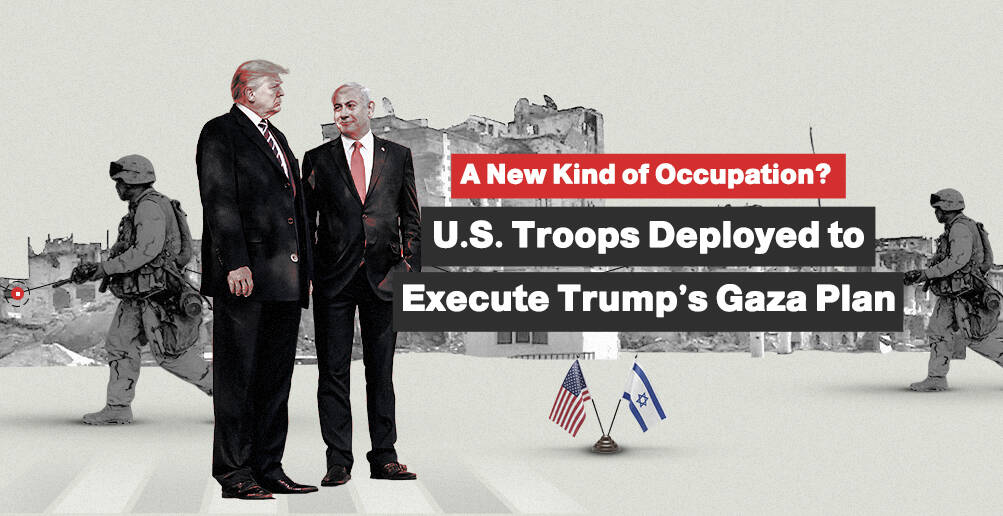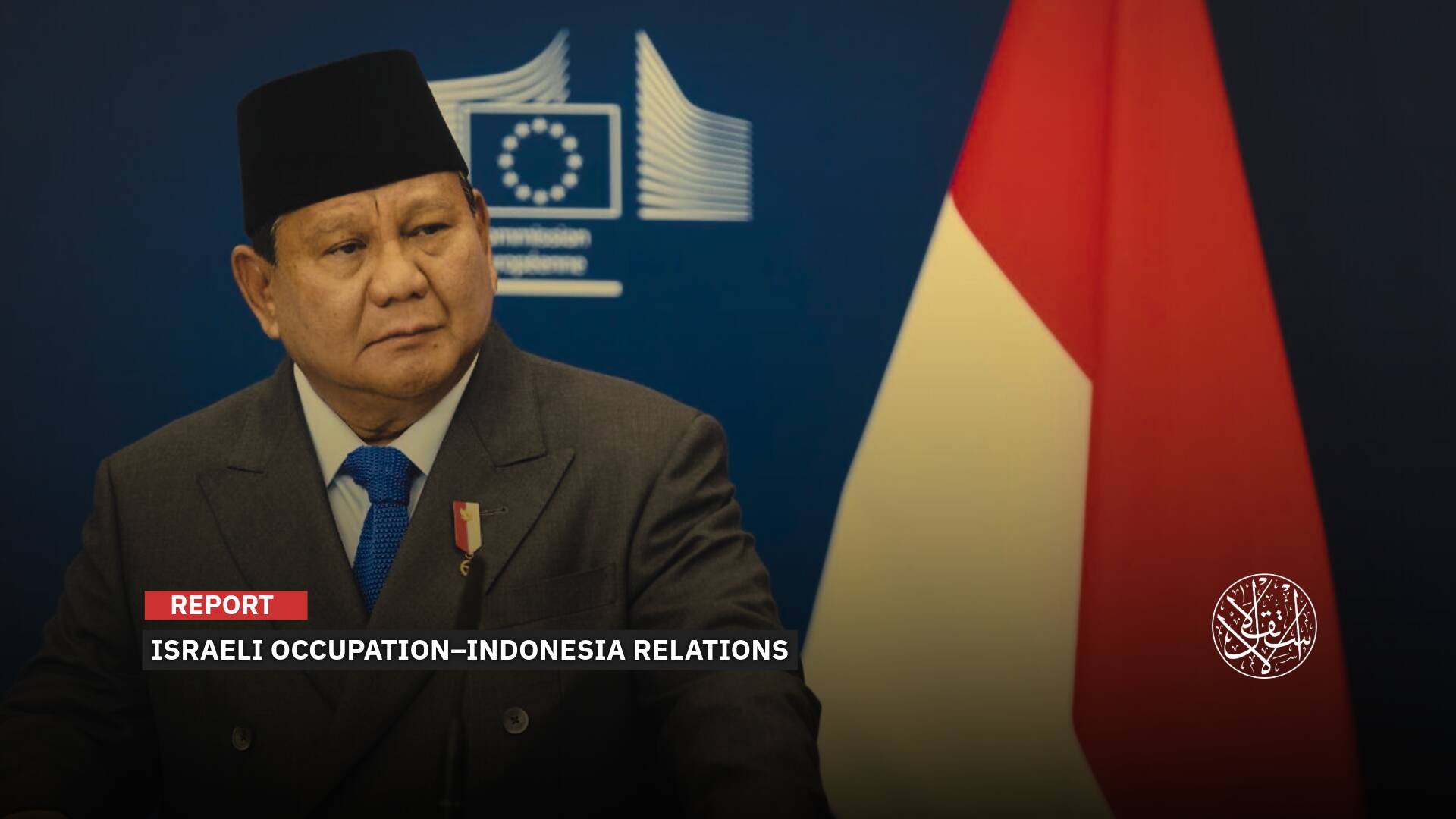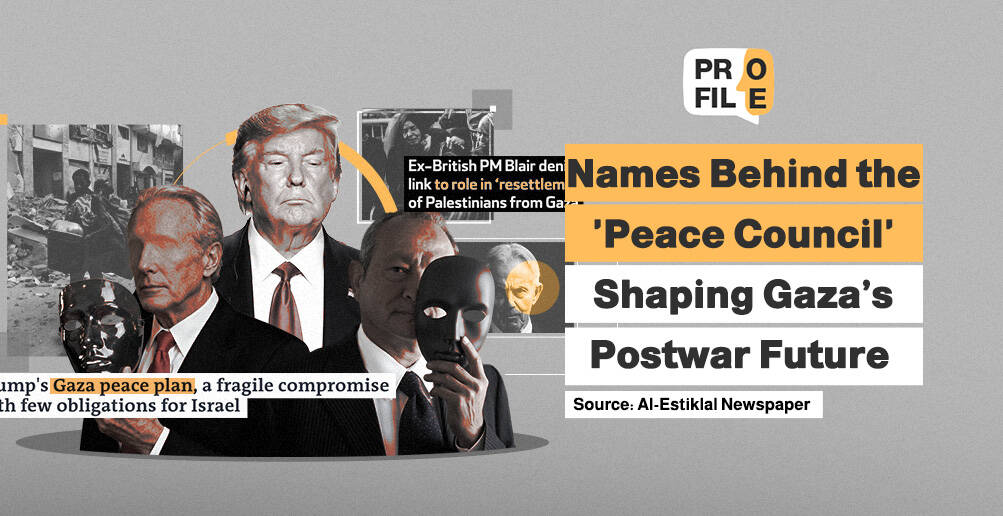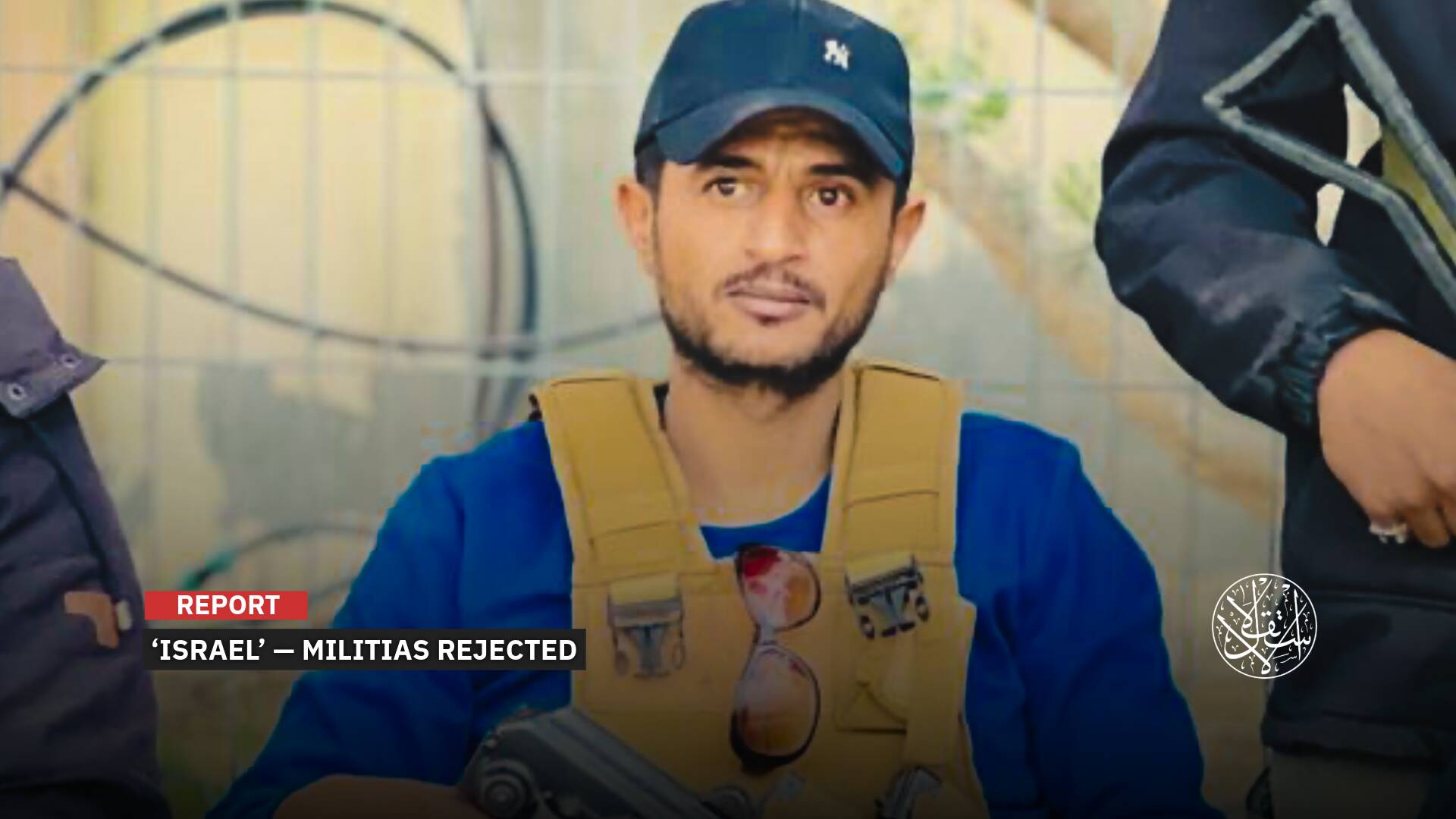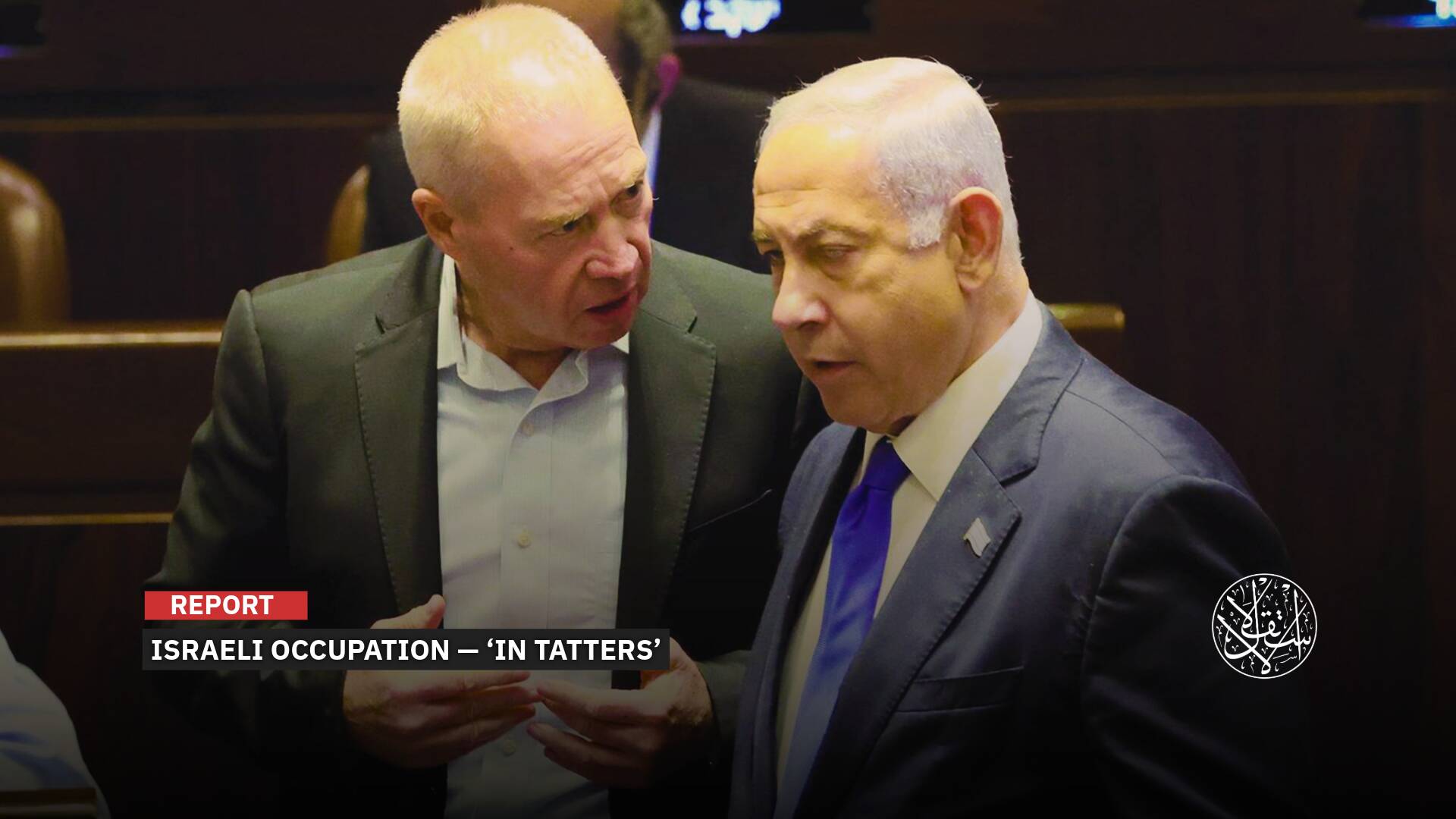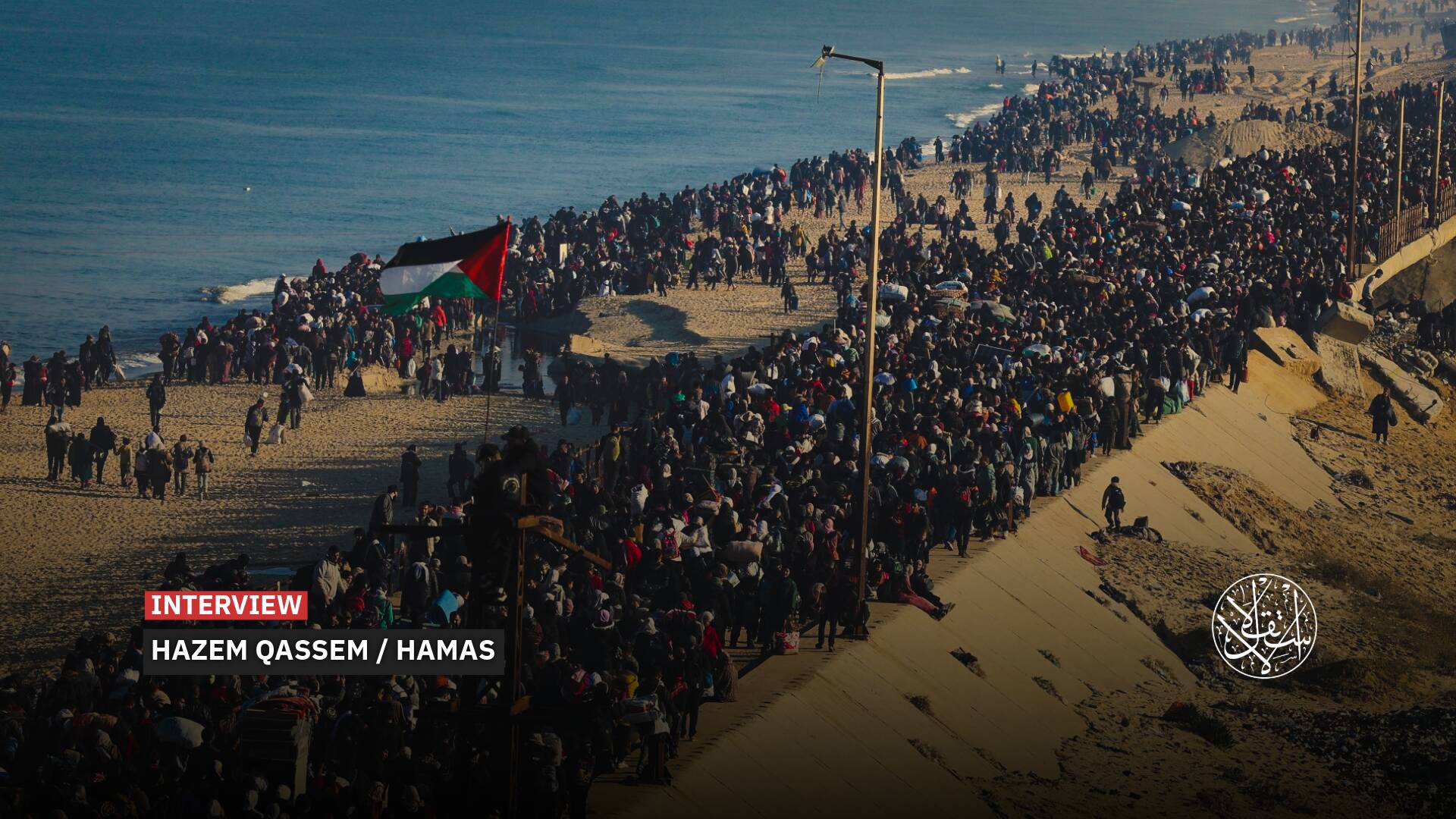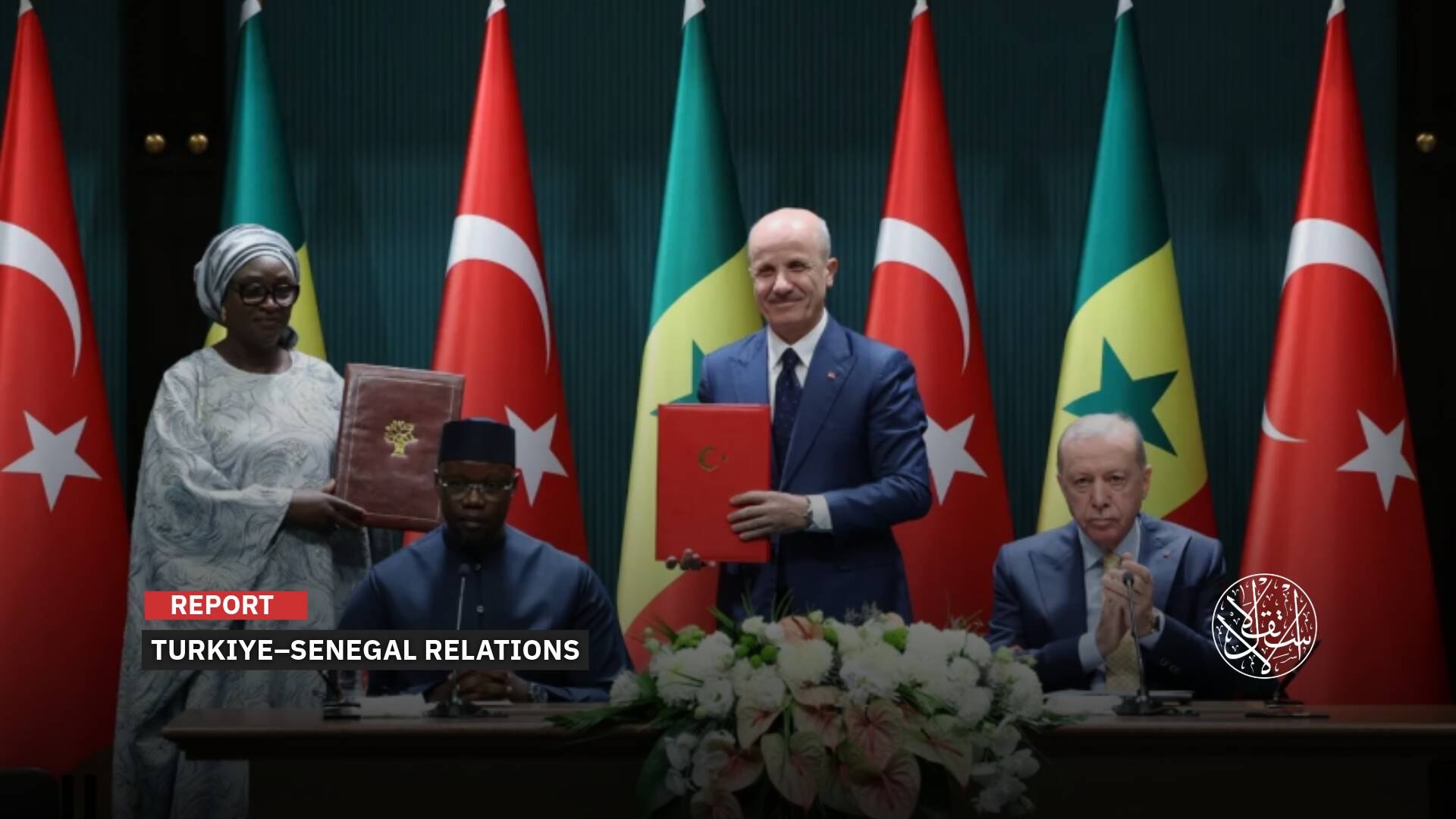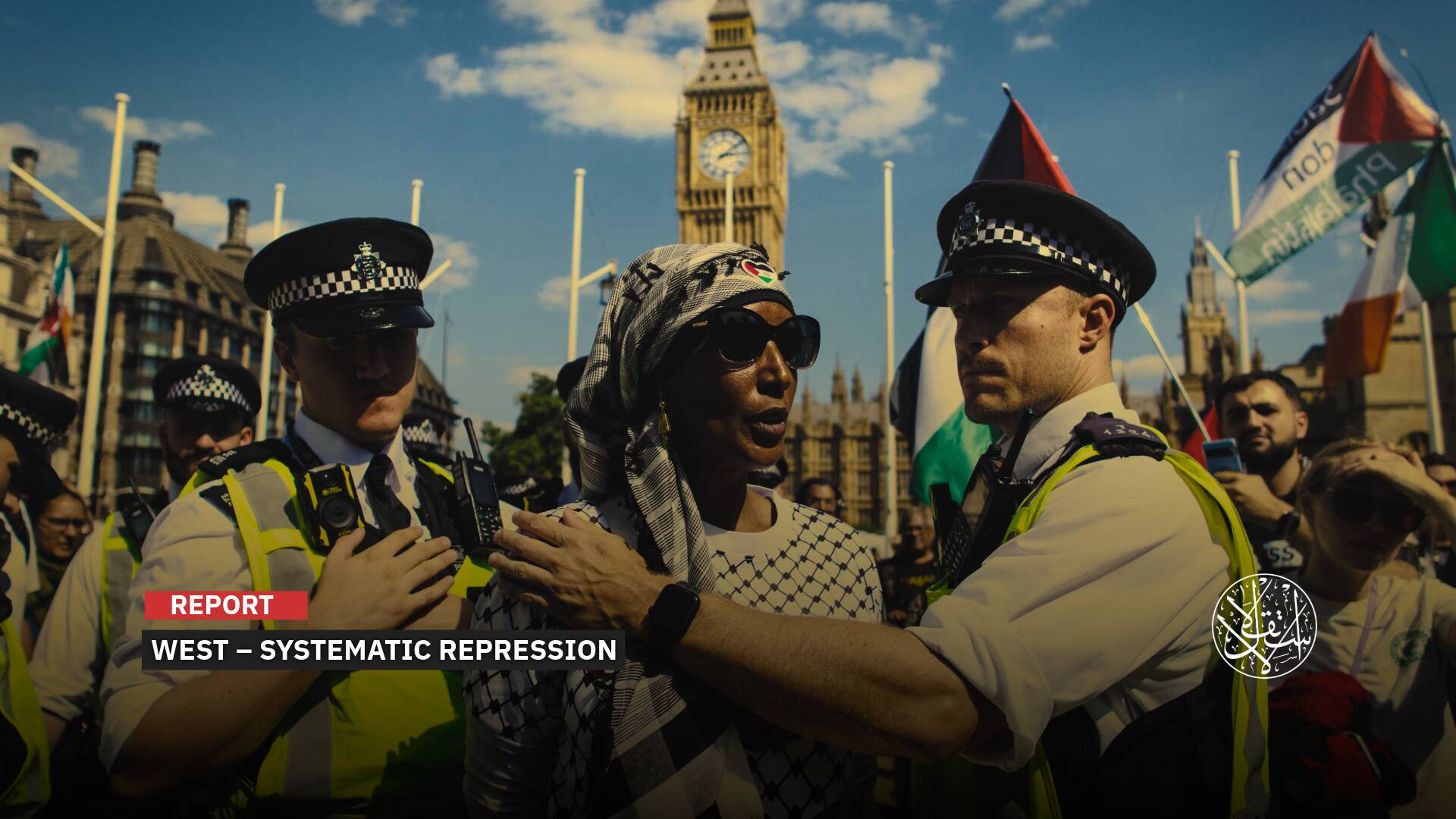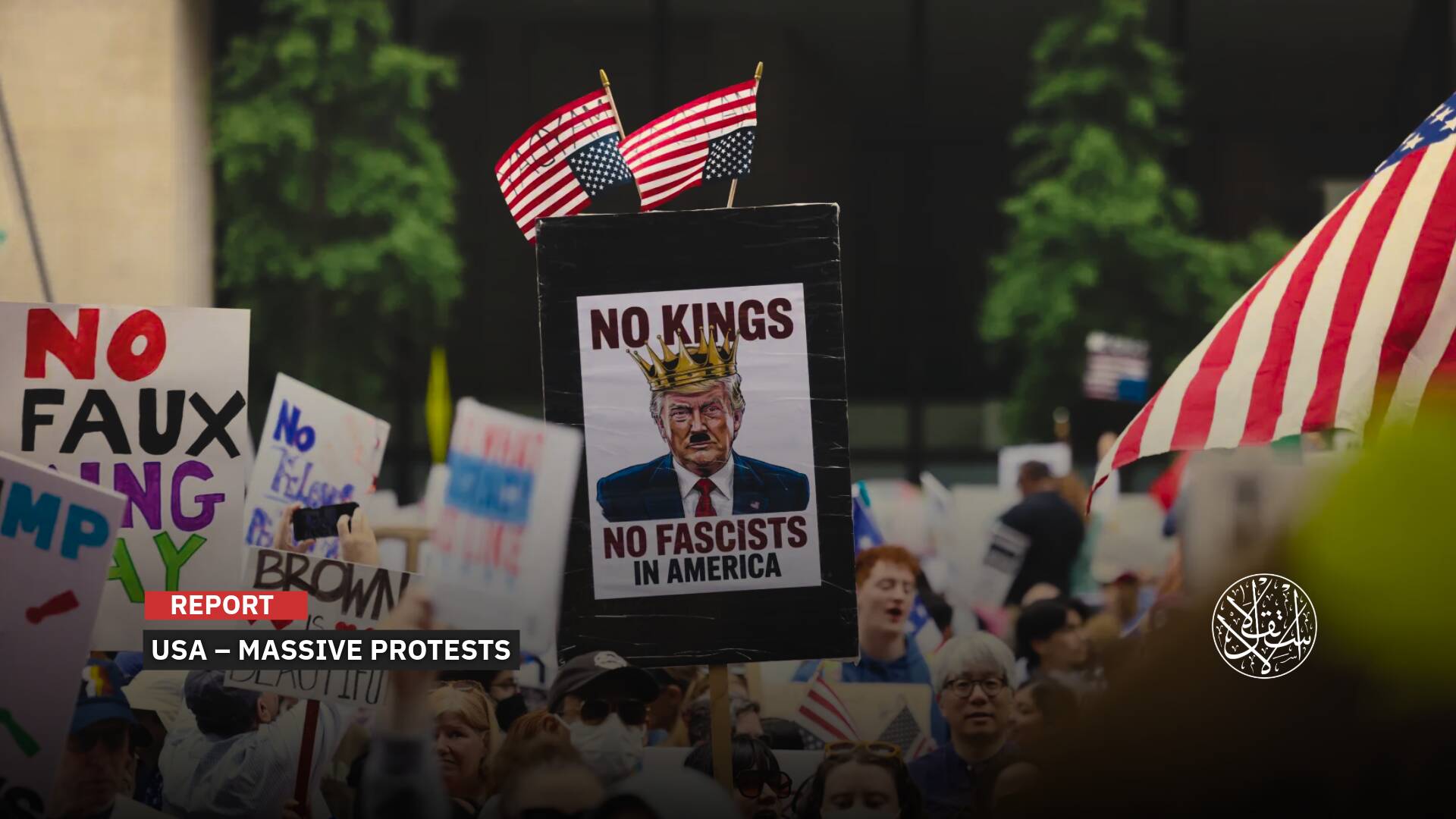Mistakes and Surprises; This Is How Israel Sees Its Military Failure in Confronting Gaza
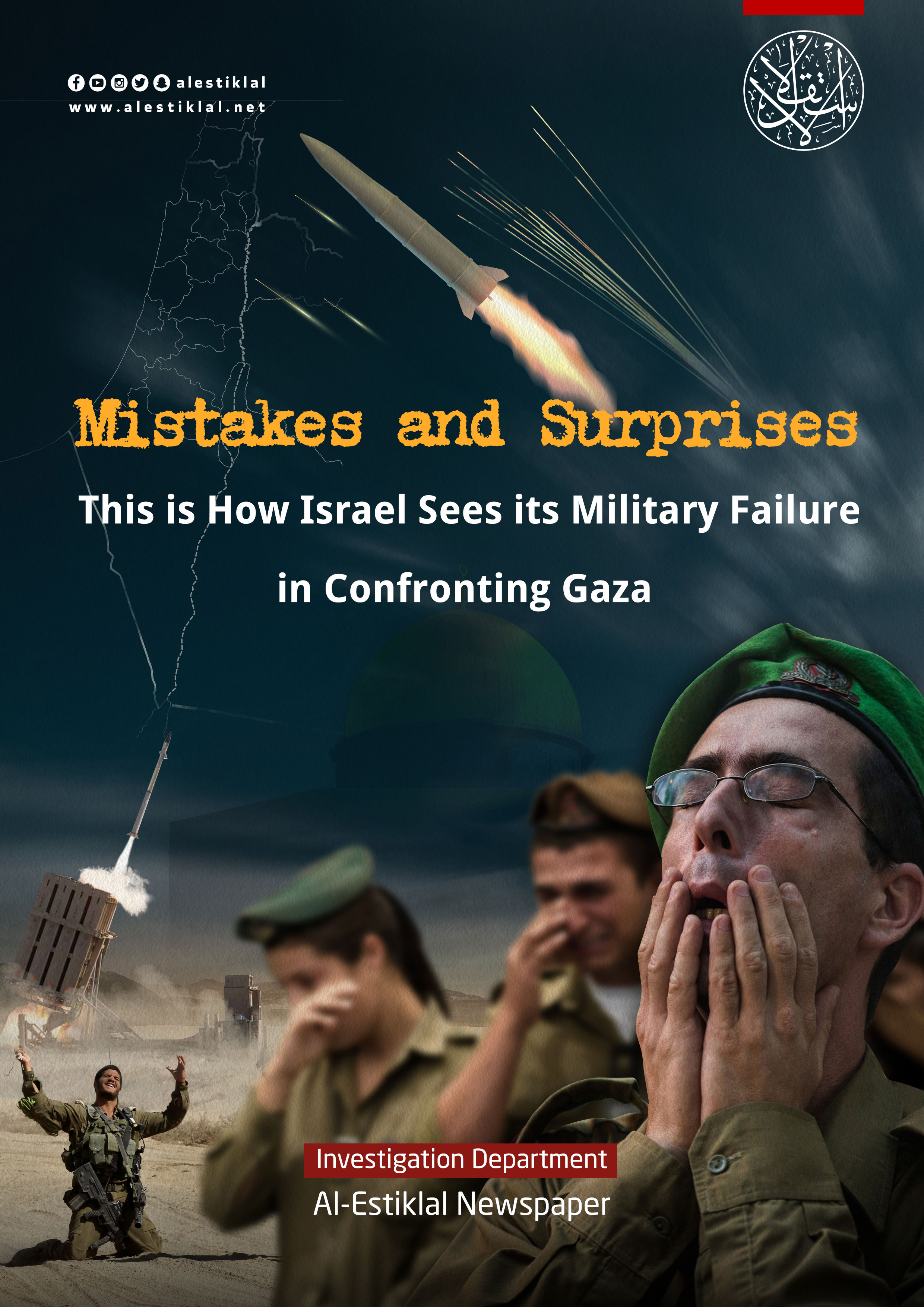
Introduction
First Section: Characteristics of Confrontation
- What are the most important distinguishing features of this aggression from its predecessor?
- What are the conditions of Hamas to stop the war?
- What are the factors that govern the Israeli decision to go to war?
- What are the manifestations of Israeli impotence in this war?
- Can a grounded incursion achieve victory for Israel over Hamas?
- What are Hamas’ successes in this round?
- What are Israel’s mistakes in this aggression?
- What are the factors for stopping or continuing the confrontation?
Second Section: Post-War:
- How will Israel face the risks of civil war?
- How will Israel face the Hamas threat after the war?
- How will Israel deal with Jerusalem and Jerusalemites?
- How will Israel deal politically with the Palestinian issue?
- What are the proposals to enhance Israeli security?
Conclusion
Introduction
The Palestinian territories are witnessing a pivotal event in the history of the conflict with the Israeli occupation, which will have future effects on the territory and the region. It is confronting the Palestinian “Operation Al-Quds Sword” or what the Israelis call “Operation Guardian of the Walls.”
The Islamic Resistance Movement Hamas began this process in response to the repeated Israeli violations in the sacred Al-Aqsa Mosque, and the attempt of the Jewish groups to impose a reality in it similar to what happened in the Ibrahimi Mosque (Cave of the Patriarchs) in Hebron. And also in response to the Judaization of the Sheikh Jarrah neighborhood in Jerusalem and the attempt of the expulsion of five hundred Palestinians from their homes.
This event revealed the unity and solidarity of the Palestinian people in all their geographical groupings, as well as the centrality of Al-Aqsa and Jerusalem in the conflict.
So Ruth Wasserman Lande, the Israeli writer for Maariv newspaper, says that “everything must be done to separate Gaza, East Jerusalem and the Israeli Arabs [48-Palestinians], because they are a poisonous mix.”
And she added: “They are the accumulated frustration in the Gaza Strip, the simmering feelings about the Al-Aqsa Mosque, and the neglect of the Arabs of Israel, and this is what brought us to where we are.”
Operation Al-Quds Sword also revealed the extent to which Hamas has good management of the conflict, its intelligence capabilities, and its reading of what the enemy thinks and plans, overcoming the conditions of the Israeli and Egyptian siege, increasing its missile capabilities in terms of range and destructive capacity, and its development of its drones. Which is now used in reconnaissance and striking enemy targets, as well as the weapon of drone submarines made by its creative minds.
The confrontation also revealed the extent of the state of weakness and deterioration on the Israeli side, and the factors that threaten the collapse and demise of Israel.
Avigdor Lieberman, a former Israeli Defense Minister, says:
“What we have seen this week in the complete loss of deterrence, order, security, governance, and the collapse of government systems is unprecedented.
“The initiative and control of events belongs to Hamas, which determines when a conflict begins and ends. As for Israel, it is being dragged to respond only.
“The State of Israel has become a hostage to Netanyahu’s personal problem, and he is endangering our existence and leading us to perdition.”
In this paper, we present an Israeli reading of this confrontation and its future, and through it we read the extent of the psychological defeat that Hamas inflicts on the occupation, which is a prelude to a heavy physical defeat on grounds that the aggressor will suffer its effects and consequences for a long time.
And despite the fact that the Palestinian paid price was high; many believe that the destiny of the Palestinian people is to be the vanguard of this nation, the locomotive of change in it, and the beacon that guides it to the straight path.
First Section: Characteristics of Confrontation :
What Are the Most Important Distinguishing Features of This Aggression From Its Predecessor?
Operation Al-Quds Sword go-round has features that distinguish it from other rounds that Hamas took in previous years. We summarize them as follows:
1- A successful Palestinian psychological war:
Hamas defined the goal of this war as “for the sake of Jerusalem,” and in this regard it seized an advantage that generated a sense of victory with regard to the Holy City, and this goal is the main reason behind the fierce behavior of the Palestinians in the occupied territories.
American expert David Wormser focused on the importance of the psychological aspects of military campaigns. Therefore, the news that the Israeli army commanders and political leaders do not want to hear is that the psychological and ideological aspects have a decisive effect in any war, “especially in the current confrontation in which we are now immersed.”
Does the Chief of General Staff of the Israel Defense Forces know that people in Gaza are fighting for the liberation of Jerusalem? This battle is tougher than the one that Mordechai “Motta” Gur and his parachutes fought in 1967.
Motta Gur is the commander of the paratroopers who, within two days, and after heavy fighting with Jordanian soldiers, were able to advance to the Old City and control the so-called Temple Mount and the Western Wall (referring to the Noble Sanctuary).
The report of Paratrooper Lieutenant Motta Gur, “The Temple Mount is in Our Hands,” remains one of the most sensational statements in the history of Israel.
So, this confrontation that Palestine is waging is more severe on the psyche of the Jews than their pride in seizing Jerusalem itself, which they have always expressed their longing for in their prayers: “If I forget you, O Jerusalem, may my right hand cease to function. May my tongue cling to the roof of my mouth if I do not remember you, if I do not exalt Jerusalem as my greatest joy!”
Therefore, in light of the foregoing, we understand the significance of the Palestinians calling this round of conflict the “Operation Al-Quds Sword,” and the occupation’s designating it as “Operation Guardian of the Walls.” These are labels that give us a complete picture of this go-round: who started it and why.
It also gives us an important picture of the morale and psychological state of each side, the way to fight it, and what will be the outcome of this confrontation:
Operation Al-Quds Sword: It means that the confrontation is for Jerusalem in defense of it and its sanctities and a step on the path to its liberation, and its name also carries the meaning of boldness and the initiative of the attack, evoking a long history of sacrifice and heroism since Omar bin Al-Khattab’s conquered it, followed by the Saladin's Conquest and the abundance of martyrs who fell at its doorstep.
The name also means decisiveness, amputation, and cutting of the enemy’s will. All of which are things that we are witnessing today. All Israel is under the rockets of the resistance, and its people are doomed to stay in the shelters, while they are besieged by the resistance’s strikes by land, sea and air.
Operation Guardian of the Walls: As for the Isreali’s naming, it is linked to a gene inherent in the Jews, a life of closure, fear, displacement and diaspora. It is also a name that indicates how they fight in fortified villages or from behind walls.
Therefore, this name was repeated in the confrontations with the Palestinian people from “Operation Defensive Shield” in 2002 during the Second Intifada, to the construction of the separation wall, and finally the Guardian of the Walls.
2- A new Palestinian strategy for conflict management:
This strategy depends on bringing the Palestinian people together on an inclusive and unifying element for all Palestinian groups and sects, and taking it as a starting point for confrontation and mobilization.
David Koren, an Israeli researcher and expert in Jerusalem affairs at the Jerusalem Institute for Strategy and Security (JISS), says: “It seems that we are witnessing a new Palestinian strategy to enhance coherence and harmony between different forefronts, and expand the scope of conflict arenas at the same time.
The new strategy is based on:
Active participation of all Palestinian pieces of the puzzle.
The expansion of the number of battlefields in a widespread and simultaneous spread; Palestinians work simultaneously in Jerusalem, Gaza, the West Bank, and Arabs within the territories occupied in 1948.
Communicating and creating a close link between the different forefronts.
The presence of an organizing role on the part of Hamas.
Changing the pattern of the Palestinian act with regard to Jerusalem.
3- Harsh surprises as Israel’s deterrence diminished:
Israeli journalist and war correspondent Ron Ben-Yishai wrote an important article in the Yedioth Ahronoth newspaper, with a very significant title: “Israel’s diminished deterrence and political turmoil are recipe for disaster.”
The article says: “Hamas has been ‘surprising’ Israel again and again since Monday evening [May 10], which should worry everyone. The massive salvos of rocket at Tel Aviv on Tuesday night and early Wednesday are a direct continuation of the terror group’s rocket strikes on the Jerusalem area on Monday.” These attacks appear as follows:
“These attacks show that Israel’s deterrence against Gaza has become virtually nonexistent.
“Israel—at all military, political, and media levels—had underestimated Hamas and Palestinian Islamic Jihad's capabilities, which they have been building since the end of the 2014 Gaza War.
“The precision of Palestinian rockets is more worrying, when these types of missiles were launched in the past, sometimes reaching as far as Hadera, they were vastly inaccurate—with most either landing in the sea or exploding mid-air. As for the rockets fired Tuesday [May 11] were not only heavily armed, but accurate to a degree Israel had never imagined.
“The decision-makers assessed that Gaza militants were still at a rather primitive stage of rocket development, opting instead to focus on other armaments such as drones…The public should have been prepared, at least mentally, for the reality.
“Even though casualties from the attacks have been ‘relatively’ low, Hamas and Islamic Jihad scored a serious victory in the game of psychological warfare against Israel.
“Useless Hamas bribes: Another concept held tightly by the IDF [Israel Defense Forces] and the politicians that has been shattered in recent days was that as the economic and humanitarian situation in Gaza improved, Hamas would be more willing to reach a long-term settlement with Israel. The logic behind this was the notion that Hamas was worried it might lose control over Gaza if the wellbeing of its citizens continued to deteriorate. Using this logic, Israel allowed Qatari money to flow into the enclave, ignoring any provocation on part of Hamas.
“As clashes between Palestinians and police in Jerusalem during Ramadan began to be more and more ferocious, Israel did all it could to get the Qatari money and the benefits flowing into Gaza. But Hamas had already set its sights on the fighting in Jerusalem.
“Israel’s leaders refused to accept that their concept was falling apart until rockets flew at Tel Aviv, making it abundantly clear that the wellbeing of Gaza does not deter the political and jihadist ambitions of Hamas and their allies.
“Another surprise that caught Israel unawares was the rioting in the Arab sector…Another lesson our leaders learned is that the violence in Israel’s Arab communities does not stay in the Arab communities, but spreads to other areas as well…[Those] events, as well as the security forces’ decision to break into the Temple Mount [the Noble Sanctuary], show that the violence and hot tempers could drag this country into an all-out race war.
We conclude from this article that Israel has lost its ability to deter Gaza. On May 10 it experienced a series of surprises beyond imagination.
What Are the Conditions of Hamas to Stop the War?
Hamas delivered a big surprise for the occupation forces by issuing a strong warning to them on May 10, which would give them two hours to either stop their violations in Al-Aqsa Mosque and Sheikh Jarrah neighborhood, or else it will fire its rockets at Jerusalem.
So Hamas is the one that started the confrontation and is the one ending it. What are the conditions of Hamas?
David Weinberg, Vice President at JISS, answers this question, by saying: “Hamas is relying on the internal political crisis in Israel and international pressure to compel the Israeli transitional government to a rapid ceasefire. In its contacts with the mediators, it set a number of conditions for a ceasefire:
A complete cessation of the Israeli attacks on the Gaza Strip.
The release of all those arrested in the recent events in Jerusalem.
Israel’s commitment not to interfere in the Temple Mount [the Noble Sanctuary].
Israel stops demanding the evacuation of Palestinian families from the Sheikh Jarrah neighborhood in East Jerusalem.”
What Are the Factors That Govern the Israeli Decision to Go to War?
David Weinberg says: “Military strategists argue that in a situation of protracted conflict against an implacable, well-entrenched, non-state enemy like Hamas, the use of force cannot attain impossible political goals.
“Rather, it is a strategy of attrition designed to temporarily deter the enemy and bring about periods of quiet along Israel’s borders.”
According to Weinberg, this Israeli vision is governed by six main factors, which are: the need to get rid of the manifestations of Israeli political, diplomatic and military weakness, the perception of the new Abraham Accords peace partners of the extent of Israel’s ability to crush Hamas, the extent of the possibility of a military victory, the experiences of previous wars, the military capabilities of Hamas, and the impact of those capabilities on the home front:
“This conflict comes on the backdrop of perceived Israeli weakness: diplomatic and military weakness because of a change in US administrations, and political weakness because of Israel’s internal electoral deadlock. Israel must show that neither infirmities have stripped the country of its military power and grit.
“Israel’s new Abraham Accords peace partners are closely watching the current conflict, too, judging Israel. They ask themselves whether Israel is going to appropriately crush Hamas (a Moslem Brotherhood- and Iran-backed enemy of the Gulf states) the way it normally would, or is Israel hamstrung by the conditions described above. A weak Israel is far less attractive as a friend to the governments in Abu Dhabi, Manama, and Riyadh.
“The problem is that short of a full-scale ground campaign to re-conquer the Gaza Strip–something that would entail enormous casualties on both sides and thus is unlikely–there is no simple solution to the catastrophe that is Hamas. The most that Israel can do is frequently “mow the grass” to degrade enemy capabilities and deter Hamas for extended periods of time…[and this is] hard work. If you fail to do so, weeds grow wild, and snakes begin to slither around in the brush. So too, reducing enemy capabilities and ambitions in Gaza requires Israeli military readiness and government willingness to use force intermittently, while maintaining a healthy and resilient Israeli home front despite repeated military offensives.
“The question is whether Israel used enough force in ‘Operation Protective Edge’ in 2014 and inflicted enough pain on the enemy to purchase a sizable-enough chunk of time as respite, before the next round of ‘grass mowing,’ which is today. The question is whether this time the cabinet will authorize enough force to hammer and deter Hamas for an even longer period going forward. A draw with Hamas is strategically unsatisfactory. In 2014…the physical destruction of homes and facilities wrought by Israel’s bombings did not frighten Hamas. Worst of all…the ‘most powerful military in the Middle East’–the IDF–failed to successfully target Hamas’ decision-makers.”
What Are the Manifestations of Israeli Impotence in This War?
There are several dilemmas in which Israel lives in front of Hamas, rendering it paralyzed and limited in its power, and placing it in great embarrassment in front of its citizens, allies and supporters. Zvi Hauser, the Knesset's Foreign Affairs and Defense Committee chairman, summarizes it, saying:
“The strategy of containing rocket attacks on civilians from the Gaza Strip is a fundamental violation of the agreement the state undertakes to defend its citizens. There is no other place in the world where civilians live under the threat of rockets as a matter of routine, with the end of each round promising another one to come.
“Bringing the front to the Israeli home front strikes a critical blow to Israel’s status as a regional power; damages Israel’s deterrent capabilities–which are vital in this area–as legitimizes turning Israeli civilians into living targets for any existing and future enemy. The tactical battle against the tunnels is countered by an pathetic, almost across-the-board approach by the political echelon and the military and the media that rocket attacks on Israel’s cities, its vital infrastructure, and its airport are almost a matter of fate and impossible to contend with.
“The paralyzing Israeli thinking when it comes to Gaza allows a relatively small terrorist organization to build up military capabilities to the south of us, similar to the Hezbollah terrorist army. Hamas’ force-building increases between every round of fighting, Israel is addicted to the idea of a long-term truce and opts for pointed tactical operations instead of a strategy that will ensure the security of thousands of its citizens.”
There is another important dilemma that Zvi Hauser did not encounter, and that is the threat of an internal war in the occupied territories of 1948, which broke out in support of the Palestinians inside the Al-Aqsa Mosque and their brothers in Gaza. It is a danger that Israeli politicians see as an existential threat more dangerous than the Gaza war itself. That is why Israeli President Reuven Rivlin said: "If we engage in an internal conflict, If we engage in internal strife we risk losing the country we so struggled to create.”
Can a Grounded Incursion Achieve Victory for Israel Over Hamas?
Israel cannot risk an all-out ground war in which it invades and controls the Gaza Strip, but rather it will suffice by striking from a distance, whether by air or artillery, or with limited ground operations.
Military analyst Amir Rapaport said: “In the middle of January 2009, the IDF was a step away from toppling Hamas in the Gaza Strip. Operation Cast Lead was underway. The Gaza Strip, only 45 kilometers long and an average of 5 kilometers wide, had been broken up into three parts. The 162nd Division operated in the central area with little resistance. The 401st armored brigade and the Givati brigade were only 4 kilometers from the heart of Gaza City. The paratroopers were a little bit north of them. The road to the coast was open. And then, under a unilateral ceasefire, the IDF was ordered to withdraw.”
A senior defense source who was deeply involved in the fighting at that time said: “Two years after it took over the Gaza Strip, Hamas was still like a mouse. We could have removed Hamas without paying a heavy price, but (then IDF Chief of Staff) Gabi Ashkenazi did not want to do it, and (then Gaza Division Commander) Yoav Gallant pretended that he did not want to do it, because Gabi did not want to do it. The political echelon did not try to argue with the military. The recommendation not to occupy all of Gaza suited it.”
“That was how the matters looked from the perspective of IDF figures. Their perspective was backed up by the foreign minister during Operation Cast Lead, Tzipi Livni, who claimed that then Defense Minister Ehud Barak was the one who strove to stop the operation unilaterally, in coordination with Egypt, behind her back and behind the back of then Prime Minister Ehud Olmert,” according to Amir Rapaport.
What Are Hamas’s Successes in This Round?
Reading Hamas’s successes and Israel’s mistakes in this confrontation is necessary and important to know its future and the extent of effort Hamas has made to employ the events well, deliver strategic surprise to the enemy, and upgrade its military capabilities on the ground:
1- Creating a new equation for the conflict:
In an article entitled “Hamas Creates a New Equation in the Conflict with Israel,” Michael Milstein, senior analyst at the Institute for Policy and Strategy at the Herzliya Center, says, quoting Mohammed Deif, supreme military commander of Izz ad-Din al-Qassam Brigades: “If the aggression against our people…doesn’t stop immediately.”
“This statement by Deif reflected the movement’s desire to create a new equation in its relations with Israel based on the claim that it is the one who protects Palestinian national and religious interests, starting with the defense of Jerusalem,” according to the article.
2- Improving its military capabilities:
Hamas has also significantly improved its military capabilities, as the current round has demonstrated that the movement today “can force nine million Israelis to live in shelters, and it can also target nearly every square centimeter of this state. And if it were not for the Israeli technological prowess (Iron Dome) and the well organized and resilient Israeli home front, heavy losses would have been implicated on life in Israel.”
3- Element of surprise:
One of the greatest achievements of Hamas is its ability to surprise the enemy and deliver a thunderous slap, says the Israeli writer Dr. Liraz Margalit: “The current round of violence reminds us that, contrary to rational assessments, Hamas has other motives driving it that Israel did not take into account and was not prepared for. And if there is one word describing our feelings in recent days, it is ‘surprise.’
“We are given a wake-up call to a reality we have already been able to forget. Since the evening of May 10, Hamas has not stopped surprising Israel. The massive rocket salvo at Gush Dan came immediately after the rockets were fired at Jerusalem.
“This is evidence of the inaction in which we find ourselves, at a time when Hamas and Islamic Jihad have built, in the last seven years, military capabilities capable of inflicting damage to the heart of Israel: its emotional heart, capital Jerusalem, and Tel Aviv, the social and commercial capital, undisputed,” as Margalit put it.
What Are Israel’s Mistakes in This Aggression?
Military commentator Amir Rapaport enumerates Israel’s mistakes at the political, military and intelligence levels, and the successes of Hamas at the same time, which is an important reading to know the future of this round. He says: “Last month there were countless errors:
“By the internal security minister and the leadership of the police, such as insisting on the placement of a metal detector at Jerusalem’s Damascus Gate during the month of Ramadan, and later withdrawing this position; the insistence on holding the ‘Dance of Flags’ parade on Jerusalem Day, and then changing the route at the last minute, [in addition to] the various incidents in Sheikh Jarrah.
“The failure by IDF intelligence to recognize the true intentions of Hamas, even though the head of its military wing, Mohammed Deif, declared explicitly that Gaza would attack because of the events in Jerusalem.
“Israel did not see the organization was preparing for the strategic achievement of being seen by Palestinian society as leading the struggle against Israel, and turning the ‘Jerusalem issue’ into a confrontation between the entire Muslim world and Israel.
“Whoever was alarmed by the rioting by Israeli Arabs [48-Palestinians] is missing the much bigger picture. In the entire Muslim world, the firing of rockets at Israel is perceived as ‘defense of the al-Aqsa mosque.’…From our perspective, this is horrible.
“One way or another, Hamas succeeded in misleading the IDF and the political echelon during this entire recent period. And as a result, unlike the Second Lebanon War [2006] and operations Cast Lead [2009], Pillar of Defense [2012] and Protective Edge [2014], this time we did not make the first move. The opening move has major tactical significance, and that was the case with the heavy barrage of missiles toward Jerusalem on Monday. It caused shock. Nothing less.
“On the Israeli side, the government, which is wracked by disputes and has difficulty functioning, was caught unprepared. The void from the lack of statesmen has been filled by tacticians, led by the three main figures in the war of 2021 until now [on top of which is] IDF Chief of Staff Aviv Kochavi…who in August 2005, as commander of the Gaza Division, closed the gate at the end of Israel’s withdrawal from Gaza. Before that, as the division commander (for those who have forgotten, the rocket fire from Gaza started long before the withdrawal), he initiated the concept of ‘canopy of fire,’ based on using circles of fire from afar, mainly by the Air Force, to deal with the rockets. As chief of staff he maintained the concept of ‘opposing fire’ even more than he did in his previous positions, despite its limited achievements.”
So, the Israeli mistakes were so numerous in this go-round that they became as if walking to their demise blindfolded and confused.
What Are the Factors for Stopping or Continuing the Confrontation?
In addition to the international efforts and the multiple mediations to stop the confrontation, its continuation is linked to the decision of both Hamas and Israel, which is governed by three main factors:
1- Achieving what would be called victory:
“Israel and Hamas know that a fourth Gaza war, like the three before, would be as inconclusive as it is devastating for the impoverished territory’s 2 million Palestinians. But in the days or weeks before an inevitable truce, each will aim for something it can call a victory.
“For Israel, that might mean assassinating a top Hamas commander, or destroying enough tunnels, rocket launchers and other infrastructure to say it ‘mowed the lawn’—a phrase widely used by Israelis to describe the temporary suppression of militants before the next confrontation.
“For Hamas, the biggest prize would be capturing Israeli soldiers it could later trade for imprisoned Palestinians [imprisoned by the occupation]. A close second would be scoring a few more long-range rocket hits on Israeli cities to display the Palestinian organization’s military prowess in confronting a much stronger enemy.”
2- The nature of the war, its course of events, and the risks of prolonging it:
“Since the war started at a high level of intensity (barrages into Israel by Hamas and Islamic Jihad, countered by targeted assassinations and the toppling of multistory buildings in Gaza), this time it will not include many weeks without progress, and will not last 51 days like Operation Protective Edge. The Israeli pounding of the Gaza Strip will reach a climax within days or a small number of weeks. The assassination of very high level Hamas figures will be a main component of the Israeli attacks…However, in war, as in war, there is no way of knowing for certain how things will turn out.
“[Ending this round] much depends on the power (or weakness) demonstrated by Israel. The longer the fighting goes on, the more it becomes clear that the biggest danger we face, even more than the missiles from Gaza, is anarchy and civil war.”
3- Realization by both parties that it is impossible to achieve all goals:
Both Israel and Hamas realize that not all of the major goals that each of them desire can achieve no matter how long the war lasts:
“To overthrow Hamas, Israel would need to reoccupy Gaza in a prolonged and bloody operation that would provoke international condemnation. Not even the most hawkish Israelis are suggesting that course.
“By the same token, Hamas has no expectation of lifting the Israeli-Egyptian blockade imposed on Gaza when it seized power from rival Palestinian forces in 2007.”
Second Section: Post-Aggression
How Will Israel Face the Risks of Civil War?
“Incitement and sectarianism have plagued Israel for a long time, and this only intensified during the political and coronavirus crises, as all of Israeli society split, and hostile rhetoric from all sides plagued media and politics as officials attempted to garner favor during four rounds of elections. Hamas saw the situation and used it to its advantage, taking the anger and hurt already simmering across Israeli society and putting it on a high flame. They may have lit the match, but we certainly had the firewood ready.
“But politicians aren’t the only ones to blame. While much of the incitement came from above, the citizens of Israel accepted, justified and helped spread it. So, when we look to heal these scars, we cannot just look up, we must also look within:
“It will take tremendous efforts by all sides in a Herculean show of unity to bridge the widened gaps. It will demand overcoming extreme fear and distrust. This will demand perhaps the largest civil effort in Israel’s history.
“Security forces need to respond to the violence and work intensively to keep the peace.
“[There must be] intensive efforts on a civil level to understand how such sectarianism can be combated. A balanced approach must be found or we will simply perpetuate the cycle of violence and push off the actual issues.”
How Will Israel Face the Hamas Threat After the War?
Israel realizes that Hamas is inevitable, and that its reoccupation of Gaza is a strategic mistake and its cost is great. Nevertheless, it considers the need to deter it. Therefore, dealing with Hamas has two levels; one of which is during the war and its impact extends beyond, and the other level is after the war:
1- During the war:
“An extensive ground operation to overthrow Hamas could bring the IDF into a state of continuous rule over a distinctly hostile population, and all that it entails,” says the former deputy for foreign policy and international affairs at Israel’s National Security Council, Colonel Eran Lerman.
“In the absence of a political alternative—seeing as how Mahmoud Abbas will not enter Gaza on an Israeli tank…The IDF blows should be intense and aimed at causing severe damage to the intermediate level of command, infrastructure and weapons,” for which it is not easy to smuggle an alternative, even causing significant damage to its total strength, according to his estimate.
He further believes that it is important that the blow reverberates with a reluctance for future military confrontation for years to come. And that Israel is not alone in having a stake in Hamas not gaining any grip on the Temple Mount [the Noble Sanctuary], thereby undermining the status of the camp of stability in the Arab world: the consequences of such an achievement for terrorism will be far-reaching, stated Lerman.
“Even if many in the Arab world protest against Israel’s actions, their actual interest is to prevent Hamas from gaining any achievements in this arena. To the same extent, it must be ensured that Hamas does not have the power to channel the dangerous attitudes on the Arab street in Israel for its own political needs.”
2- After the war:
As for the Israeli dealings with Hamas after the war, it is based on: weakening it politically by limiting its control over the Palestinian affairs and Palestinian communities, and weakening it militarily by disarming it.
Udi Dekel, a researcher at the Institute for National Security Studies (INSS), talks about the political weakening of Hamas and its impact on the Palestinians. He says: “A multi-front and multi-disciplinary strategic outlook is required to serve as a means of planning and managing the respective fronts, relating both to the present and to the future:
“The flames in Israel’s mixed towns [occupied territories] must be lowered. The current tensions should not be cast as a civil war, as this plays into how an extremist minority on both sides frames the events.
“The campaign against Hamas must be managed with the knowledge that a military achievement has its limits. The objective is to impose Israel’s terms for a cessation of hostilities and to prevent Hamas’s dominating in the Palestinian arena, while denying its blackmail power and controlling imports of resources to the Strip so they cannot be used for future military buildup.
“The West Bank must be kept outside the escalation cycle, through security coordination with the Palestinian Authority.
“Israel should formulate an objective centering on a renewal of the political process with the Palestinian Authority, even if that boils down to incremental transition arrangements only.
“In order to engender positive cognitive diplomacy for Israel internationally, video clips should be disseminated that convey the Israeli narrative at this time.”
The head of the Knesset Security Committee, Zvi Hauser, believes that “Israel has no choice. The extent of the rocket fire we have endured in the past decade demands that we anchor the concept of taking Gaza's rockets away as the central tenet of the ‘last round’—demilitarization along the lines of how Syrian President Bashar Assad divested himself of chemical weapons a few years ago.”
He adds that “removing heavy weapons from Gaza was the goal of Operation Protective Edge in 2014. We must not retreat from that target. Hamas will need to choose between power or rockets. It cannot continue to hold onto both.”
How will Israel deal with Jerusalem and Jerusalemites?
David Koren analyzes the events of Jerusalem and how to deal with them by saying: “The recent violence in Jerusalem once again raises the question: What causes Jerusalem to ‘burn’ with national-religious tensions?
“However, the more fascinating and important question is what keeps the city quiet and calm for long periods of time, despite intensive daily contact between Jews and Arabs?
“As long as the current political situation remains unchanged, the assumption is that given the intensity of the religious and national dispute over Jerusalem, violent conflicts in the city are a scenario that Israel must be prepared to contend with on a regular basis.
“Although Israel controls Jerusalem, the Palestinians have not shown any sign of relinquishing their desire for sovereignty and rule over eastern Jerusalem. The core issues surrounding the fight for sovereignty over the city,…[above all of which are] issues concerning the Temple Mount [the Noble Sanctuary] and the Holy Basin,…remain in full force as the basis of disagreement between the parties, and create a powerful blend of religious and national tension.
“The construction of the security fence in 2005-2007 severed eastern Jerusalem from Ramallah and the rest of Judea and Samaria [the West Bank]…, this gradually led to the formation of a unique Jerusalemite identity amongst the Arabs of eastern Jerusalem, at the heart of which is their connection to the Temple Mount [the Noble Sanctuary] and the Al-Aqsa Mosque, not only as an Islamic symbol but also as a Palestinian national symbol.
“[Therefore,] a fundamental policy that must be upheld by the Israeli side is to leave the Temple Mount [the Noble Sanctuary] out of Jerusalem conflicts, as much as possible.”
Koren wrote another article after the outbreak of the confrontation, in which he analyzes the causes of the events and what Israel must do to prevent the outbreak of other “acts of violence” in the Holy City, focusing on the Arab side, following the policy of the carrot and stick and the policy of divide and rule, weakening the Islamic affiliation of Jerusalem youth and reshaping the Jerusalem mind.
Among the most important of what he said: “The recent violence is, among other things, the fruit of the in-depth foreign infiltration of Islamic elements, led by Turkey, into East Jerusalem. This penetration aims to shape the image of East Jerusalem’s youth in more distinct Islamic colors. The innocent sows the seeds of violent religious protest against the Israeli police forces in particular, and against Jews in general in the streets of Jerusalem.
The proposed update of the Israeli policy on the Jerusalem front, and the entire Palestinian arena, including Israeli Arabs [48-Palestinians], and the Jerusalem interior circle, includes the following:
Strong police forces.
Empowering and expanding the Israeli alternative represented by the provision of services by the municipality and government ministries, especially in the fields of mind-shaping such as culture, welfare, society, youth and education.
An integrative and inter-organizational view of all components of the Palestinian arena and the interrelationship between them.
The distinction between neighborhoods and districts within eastern Jerusalem itself, which consists of 19 neighborhoods. Riots must be dealt with forcefully in neighborhoods where violence prevails, while spreading “business as usual” in the neighborhoods that prevail in silence.
Combating foreign subversion requires both regular monitoring of legal, security and foreign policy elements through illegal activities by foreign actors in eastern Jerusalem, and the strengthening of Israeli civilian measures in a way that provides a good alternative to civilian well-being, education, and cultural services.
How Will Israel Deal Politically With the Palestinian Issue?
The belief that normalization deals with Arab countries would put the Palestinian problem aside on the local, regional and international agendas, has now been unequivocally dispelled.
The challenges posed by the Israeli–Palestinian issue exist and are destined to reappear from time to another, and thus requires Israel to conduct renewed multi-system strategic thinking that focuses on:
Renewing the political process with the Palestinian Authority, even if there is no expectation or tendency to push for a comprehensive agreement.
Gradual transitional arrangements aimed at improving the security and civilian reality in the conflict area.
Preventing the Hamas takeover of the Palestinian agenda.
Jordan must be returned to its role as an element of moderation and a partner in the arrangements between Israel and the Palestinian Authority.
What Are the Proposals to Enhance Israeli Security?
Retired Major General Gershon Hacohen reviews the current Israeli security problems and proposals to strengthen it so that Israel can be quicker in facing dangers and would be able to fight efficiently on several fronts at the same time.
He says: “Had riots erupted during a major war combining the northern arena with Gaza, the dire consequences would have been beyond imagination. Two basic failures stand out in the defense establishment:
“The first lies in the significant shortage of emergency forces in the hands of the Israeli police and the IDF. For more than three decades, there has been a trend to reduce the order of IDF forces, especially in the reserve units, [to create an] illusion of a small and smart army. It is true that precision-guided and effective intelligence new weapons give the IDF a quality advantage. But despite the technological breakthrough, the thought that the era of mass recruitment is over is denied to the complex dimensions of the war phenomenon. So the main combat effort must certainly be carried out by an elite high-quality strike force, but they would still need support from a large quantitative mass of medium quality.
“The second failure lies the lack of a massive ‘spatial defense’ system that is based on army-trained armed civilians, of local residents in the border communities: Given the recent tidal wave of Arab violence across Israel, there is an urgent need to create a large internal security force based on reservists, which will operate under the Home Front Command or the Border Guard. They can easily be recruited into this very important national mission to reassert the state’s sovereignty, its viability, and the rule of law throughout the country.”
Conclusion
Hamas achieved a strategic surprise that astonished and confused Israel, revealed its weaknesses, and brought the Palestinian Cause back to the facade after the frenzied attempts to annihilate it through the Deal Of The Century (Washington’s alleged peace plan) and the Arab normalization agreements known as the Abraham Accords.
It also investigated the unity and solidarity of the Palestinian ranks around Al-Aqsa and the fundemantalist issues in the conflict: Al-Aqsa Mosque, Jerusalem, settlements, and the unjust siege imposed on Gaza.
Hence, the date of May 10, 2021, became a watershed day in the history of the Palestinian Cause, the region, and the future of Israel, and what is after will never be the same as before.


